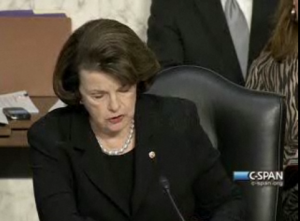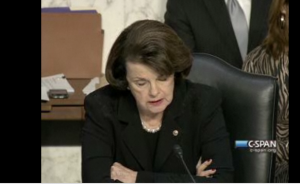To explain why it caved on its Defense Authorization veto threat, the Obama Administration had the following to say about the affirmation of detention authority.
Ensuring that we track current law and minimize risks associated with legislating on AUMF:
Made our requested modifications to the provision that codifies military detention authority under the September 2001 Authorization for Use of Military Force. Though this provision remains unnecessary, the changes ensure that we are merely restating our existing legal authorities and minimize the risk of unnecessary and distracting litigation.
That is, the Administration says its past complaints about the AUMF language have been addressed.
On November 17, when Obama issued his veto threat, the AUMF language said:
Congress affirms that the authority of the President to use all necessary and appropriate force pursuant to the Authorization for Use of Military Force (Public Law 107-40) includes the authority for the Armed Forces of the United States to detain covered persons (as defined in subsection (b)) pending disposition under the law of war.
COVERED PERSONS–A covered person under this section is any person as follows:
(1) A person who planned, authorized, committed, or aided the terrorist attacks that occurred on September 11, 2001, or harbored those responsible for those attacks.
(2) A person who was part of or substantially supported al-Qaeda, the Taliban, or associated forces that are engaged in hostilities against the United States or its coalition partners, including any person who has committed a belligerent act or who has supported such hostilities in aid of such enemy forces.
[snip]
(d) CONSTRUCTION.–. Nothing in this section is intended to limit or expand the authority of the President or the scope of the Authorization for Use of Military Force.
The language of the conference bill Obama says he won’t veto says:
Congress affirms that the authority of the President to use all necessary and appropriate force pursuant to the Authorization for Use of Military Force (Public Law 107-40) includes the authority for the Armed Forces of the United States to detain covered persons (as defined in subsection (b)) pending disposition under the law of war.
COVERED PERSONS–A covered person under this section is any person as follows:
(1) A person who planned, authorized, committed, or aided the terrorist attacks that occurred on September 11, 2001, or harbored those responsible for those attacks.
(2) A person who was part of or substantially supported al-Qaeda, the Taliban, or associated forces that are engaged in hostilities against the United States or its coalition partners, including any person who has committed a belligerent act or who has supported such hostilities in aid of such enemy forces.
[snip]
(d) CONSTRUCTION.–. Nothing in this section is intended to limit or expand the authority of the President or the scope of the Authorization for Use of Military Force.
If you haven’t figured it out, the specific language relating to the terms of the AUMF remains precisely the same.
In other words, Congress made no substantive changes to the AUMF language between the time the Administration issued its veto threat and the time it withdrew the threat.
And yet, when Obama issued his veto threat, he had this complaint about it.
Section 1031 attempts to expressly codify the detention authority that exists under the Authorization for Use of Military Force (Public Law 107-40) (the “AUMF”). The authorities granted by the AUMF, including the detention authority, are essential to our ability to protect the American people from the threat posed by al-Qa’ida and its associated forces, and have enabled us to confront the full range of threats this country faces from those organizations and individuals. Because the authorities codified in this section already exist, the Administration does not believe codification is necessary and poses some risk. After a decade of settled jurisprudence on detention authority, Congress must be careful not to open a whole new series of legal questions that will distract from our efforts to protect the country. While the current language minimizes many of those risks, future legislative action must ensure that the codification in statute of express military detention authority does not carry unintended consequences that could compromise our ability to protect the American people.
There are two explanations for why Obama backed off his veto threat on this point, then. First, we know the Administration did make a request regarding the language in the AUMF clause, though before it issued its veto threat.
As I reported last month, the big change between the original language and the Senate bill in this clause was the removal of the language exempting US citizens from indefinite detention. And that was a change made at the request of the Administration.
The initial bill reported by the committee included language expressly precluding “the detention of citizens or lawful resident aliens of the United States on the basis of conduct taking place within the United States, except to the extent permitted by the Constitution of the United States.” The Administration asked that this language be removed from the bill. [my emphasis]
So maybe Obama backed off his veto threat because the final bill didn’t specifically exempt Americans from indefinite detention.
There’s the one other change made to this section between Obama’s veto threat and and his retraction of that threat today. DiFi’s cop-out language:
(e) AUTHORITIES–Nothing in this section shall be constructed to affect existing law or authorities relating to the detention of United States citizens, lawful resident aliens of the United States, or any other persons who are captured or arrested in the United States.
The only thing that changed between Obama’s veto threat and his retraction of his threat–though it was depicted as a sop to civil libertarians worried about indefinite detention–is DiFi’s language.
And while DiFi’s amendment seems somewhat duplicative of the “CONSTRUCTION” language–reiterating Obama’s authority under the Afghan AUMF–it is actually more than that. To some degree, it accomplishes the same thing Mark Udall’s wrong-headed amendment did: not only reaffirm the President’s authority under the Afghan AUMF, but also the Iraq AUMF and “any other statutory or constitutional authority” regarding detention.
(2) The Authorization for Use of Military Force Against Iraq Resolution 2002 (Public Law 107-243).
(3) Any other statutory or constitutional authority for use of military force.
As I’ve noted, the Iraq AUMF has served to generalize Presidential claims to war powers against terrorists who have no ties to al Qaeda since at least 2004.
And while the Afghan AUMF and Hamdi and Quirin were–according to Charlie Savage–the primary bases claimed for the Administration’s authority to kill Anwar al-Awlaki (in spite of the fact that AQAP did not exist, and therefore should not really be included in, the 2001 AUMF), the Administration also relied on two SCOTUS cases approving of the use of “deadly force” to prevent the escape of even unarmed suspects who might pose a “significant threat of death or serious physical injury” to others (even if only to the cop using the deadly force).
It also cited several other Supreme Court precedents, like a 2007 case involving a high-speed chase and a 1985 case involving the shooting of a fleeing suspect, finding that it was constitutional for the police to take actions that put a suspect in serious risk of death in order to curtail an imminent risk to innocent people.
The document’s authors argued that “imminent” risks could include those by an enemy leader who is in the business of attacking the United States whenever possible, even if he is not in the midst of launching an attack at the precise moment he is located.
In other words, by affirming all purportedly existing statutory authority, DiFi’s “fix” not only reaffirmed the AUMF covering a war Obama ended today, but also affirmed the Executive Branch’s authority to use deadly force when ostensibly trying to detain people it claims present a “significant threat of death or serious physical injury.” It affirms language that allows “deadly force” in the name of attempted detention.
In any case, it’s one or the other (or both). Either the AUMF language became acceptable to Obama because it included American citizens in the Afghan AUMF and/or it became acceptable because, among other things, it affirmed the Executive Branch’s authority to use deadly force in the guise of apprehending someone whom the Executive Branch says represents a “significant threat.”
My guess is the correct answer to this “either/or” question is “both.”
So DiFi’s fix, which had the support of many Senators trying to protect civil liberties, probably made the matter worse.
In its more general capitulation on the veto, the Administration stated that the existing bill protects the Administration’s authority to “incapacitate dangerous terrorists.” “Incapacitate dangerous terrorists,” “use of deadly force” with those who present a “significant threat of death or serious physical injury.” No matter how you describe Presidential authority to kill Americans with no due process, the status quo appears undiminished.
Update: I added “among other things” because the statutes the Executive Branch has relied on include a bunch of other things besides just the “deadly use of force.”


